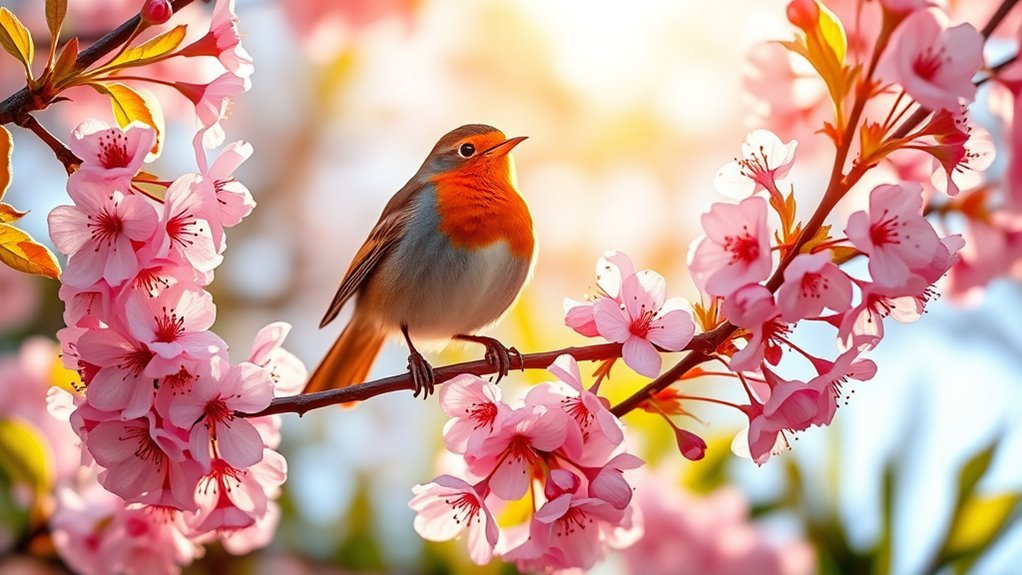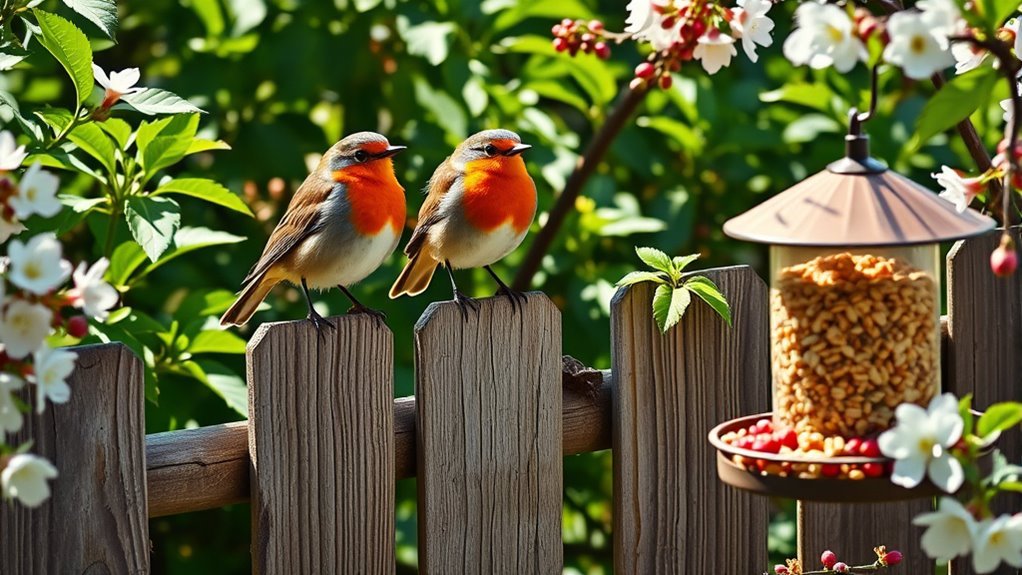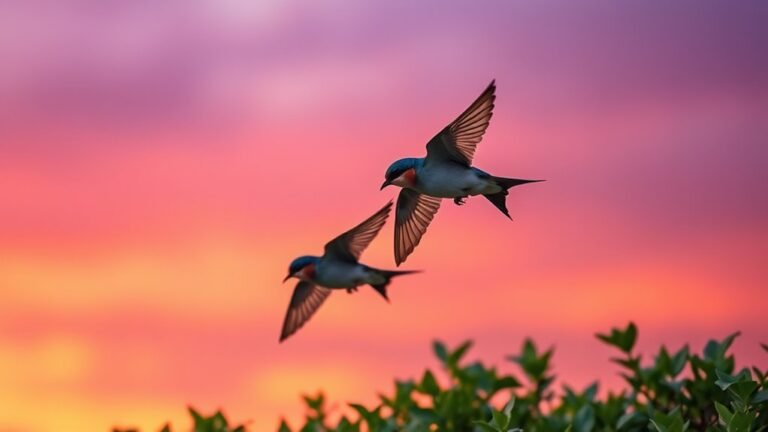Robin Birds: Their Meaning and Significance Explained
When you see a robin, you see more than a bird. You see a symbol with deep cultural meaning. Robins represent renewal and the arrival of spring. They evoke warmth and a sense of community. Their red breasts often symbolize change and hope. This understanding of robins reveals our connection with nature. What else do these birds symbolize in different cultures around the world?
Key Takeaways
- Robins symbolize renewal and hope, marking the arrival of spring and fostering a sense of community with their bright red breasts.
- Various cultures attributed spiritual significance to robins, seeing them as guides for souls or symbols of new beginnings.
- The return of robins indicates seasonal change and enhances outdoor experiences through their songs and activities in gardens.
- Emotional connections to robins evoke nostalgia and joy, providing comfort and reminding people of shared nature experiences and loved ones.
- Attracting robins to gardens can be achieved through food, water, shelter, and maintaining a clean environment, promoting wildlife interaction.
The Symbolism of the Robin: A Cultural Overview

The robin holds strong cultural significance in many societies. This small bird represents renewal and hope, often marking the arrival of spring.
Its bright red breast symbolizes warmth and community, highlighting connections between personal experiences and the larger group. In folklore, robins serve as messengers of change, reminding us that life's transitions can lead to growth.
Their presence can evoke feelings of comfort and familiarity, fostering a sense of belonging. Overall, the symbolism of the robin connects people through shared meanings and experiences tied to this remarkable bird.
Robins in Folklore and Mythology
Robins have fascinated people throughout history. Many cultures see them as symbols of change and renewal.
Here are some notable myths about robins:
- In ancient Rome, robins marked the start of spring and the rebirth of nature.
- Native American cultures believed robins acted as guides for souls after death.
- In British folklore, robins were seen as lucky and protective spirits.
- Celtic myths connected robins to the sun, symbolizing new beginnings.
These myths show the strong connection between robins and human life.
They reflect our longing for renewal and our bond with nature. Through their stories, you can explore ideas of transformation in your own life.
The Robin as a Harbinger of Spring

Robins return in spring, signaling a change in the season. Their songs fill the air as temperatures rise, marking this time of renewal.
These birds migrate back to their habitats, showing a clear link between their presence and changes in the environment. Studies show that robins help with plant pollination and seed dispersal, making them important for ecosystems.
The sight of robins also encourages people to engage in activities like gardening and outdoor events. This fosters community spirit during springtime.
Watching robins can deepen your awareness of seasonal changes and highlight the connections within nature. As life begins anew, their presence serves as a reminder of the cycles that shape our environment.
Emotional Connections: Robins and Human Experience
Observing robins in your garden can stir strong feelings connected to the seasons. These birds represent springtime and reflect human experiences.
They evoke:
- Joy from watching them on sunny mornings.
- Nostalgia for childhood days spent outside.
- Hope that comes with renewal after winter.
- Comfort as reminders of loved ones we've lost.
Robins create connections to nature and each other. They symbolize our journeys through life's cycles.
Their cheerful song and bright colors uplift us, creating a sense of belonging in a busy world.
How to Attract Robins to Your Garden

To attract robins to your garden, focus on their needs and habits.
Create an inviting space by adding dense shrubs and small trees for shelter and nesting.
Offer food like mealworms, berries, and seeds in easy-to-reach feeders or on the ground.
Robins also like water, so include a shallow birdbath to make your garden more appealing.
Keep your garden clean and well-maintained to provide a safe environment.
Watching robins enjoy your garden adds beauty and helps you connect with nature, enriching your wildlife experience.
Frequently Asked Questions
Do Robins Migrate Alone or in Groups?
Robins migrate in groups. They are social birds and prefer to travel together. This grouping helps them stay safe and provide support during their long migratory journeys. Traveling in groups increases their chances of survival. Observing robins during migration shows how they work together in this process.
What Do Baby Robins Eat After Hatching?
After they hatch, baby robins depend on their parents for food. Their main diet includes soft insects and worms. This diet helps them grow and thrive quickly. As they eat, you can see how fast they develop.
How Long Do Robins Typically Live in the Wild?
In the wild, robins typically live for two to five years. Some may live longer if conditions are ideal. This range highlights the challenges robins face in nature. Understanding their lifespan can help you appreciate their resilience and adaptability.
What Predators Threaten Robins in Their Natural Habitat?
In their natural habitat, robins encounter dangers from predators like hawks, snakes, and raccoons. These threats can impact their survival and influence how they behave and build nests. Understanding these challenges helps us appreciate the ways robins adapt to protect themselves.
Are Robins Aggressive Toward Other Bird Species?
Robins display territorial behavior, particularly during breeding seasons. They often chase away other bird species to protect their feeding grounds. This aggression is linked to their need for specific areas that provide sufficient food resources necessary for their survival. Understanding this behavior can help bird watchers appreciate the dynamics of Robin interactions with other species.

Hello, I’m Emily Price, the founder of Birds Affection. As a passionate bird enthusiast and spiritual seeker, I’ve always been fascinated by the symbolic meanings and mystical connections between birds and our lives. On this website, I share my knowledge and insights on the spiritual significance of various bird species, exploring their roles as messengers, guides, and teachers. Through my writing, I aim to inspire and educate others on the profound wisdom and beauty that birds bring to our world. Join me on this journey as we delve into the enchanting realm of bird symbolism and discover the hidden meanings behind these magnificent creatures.







